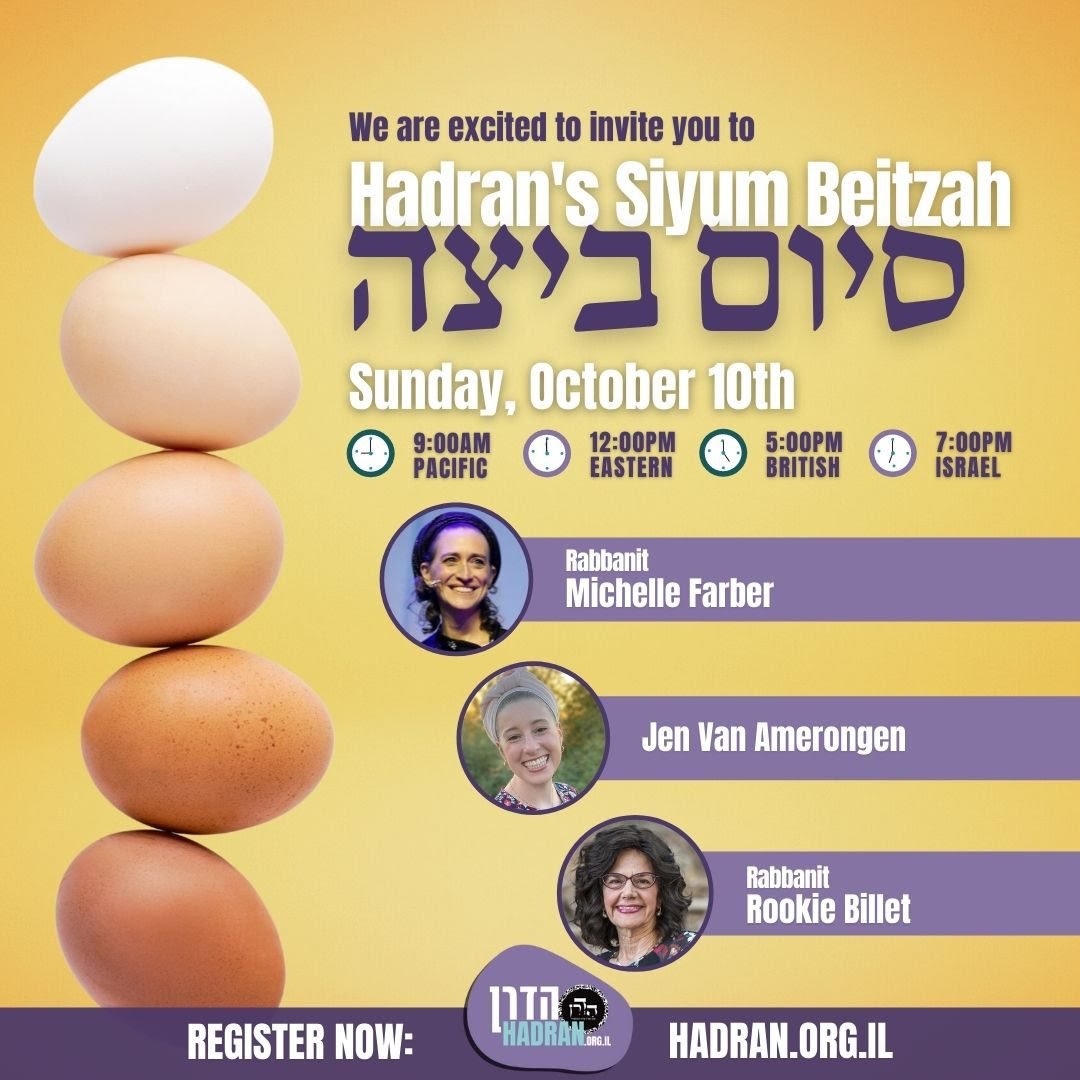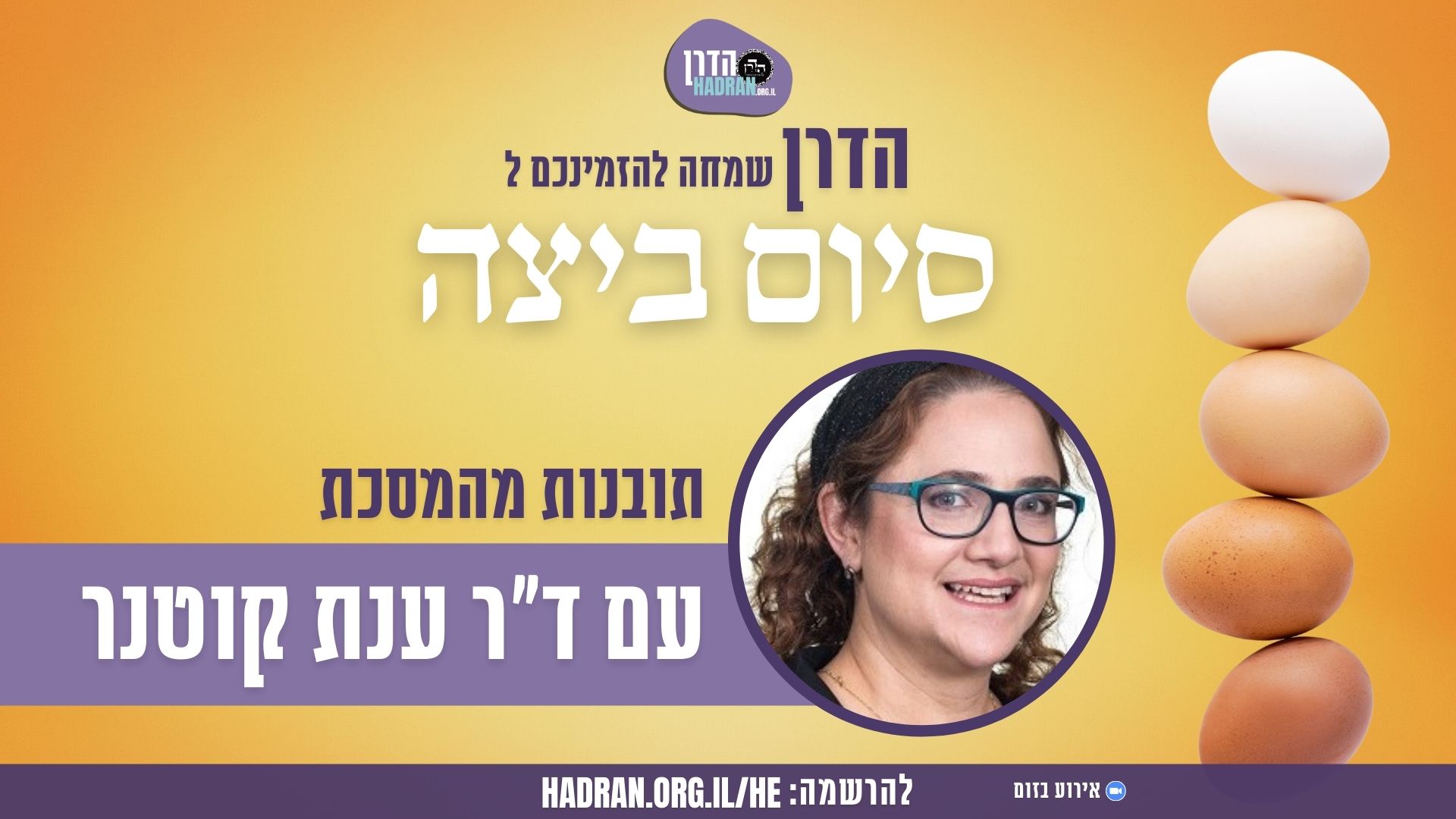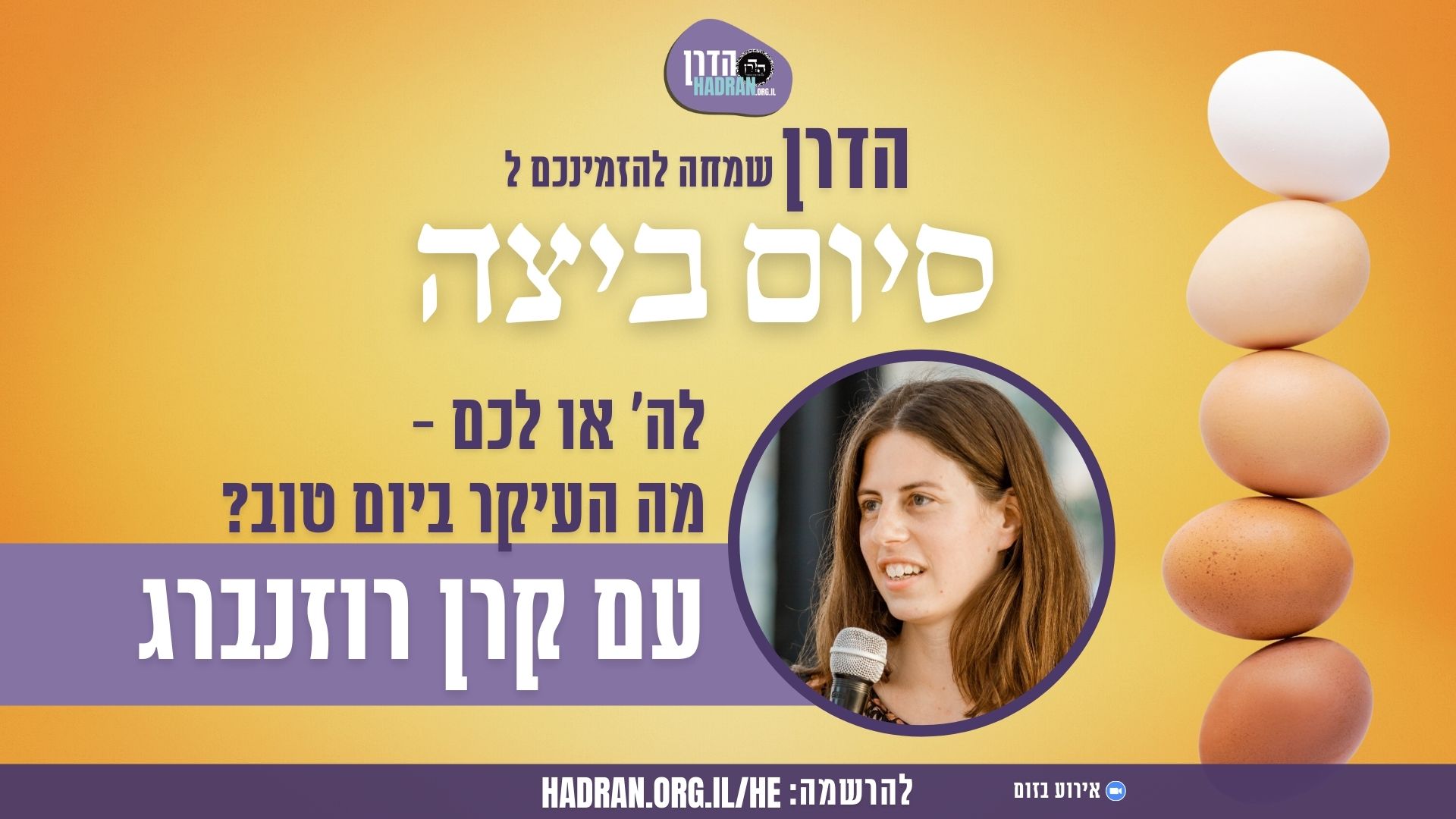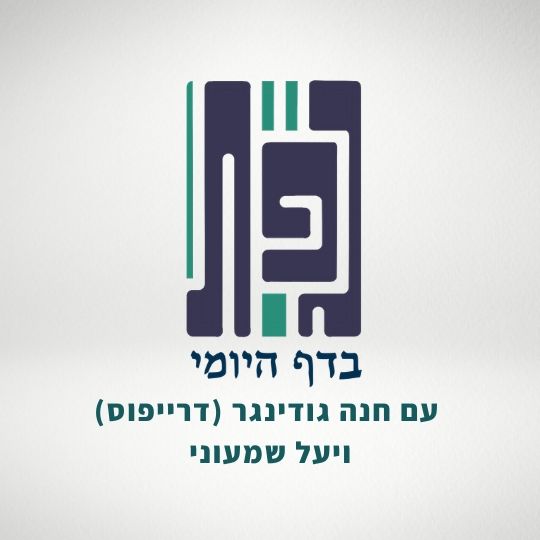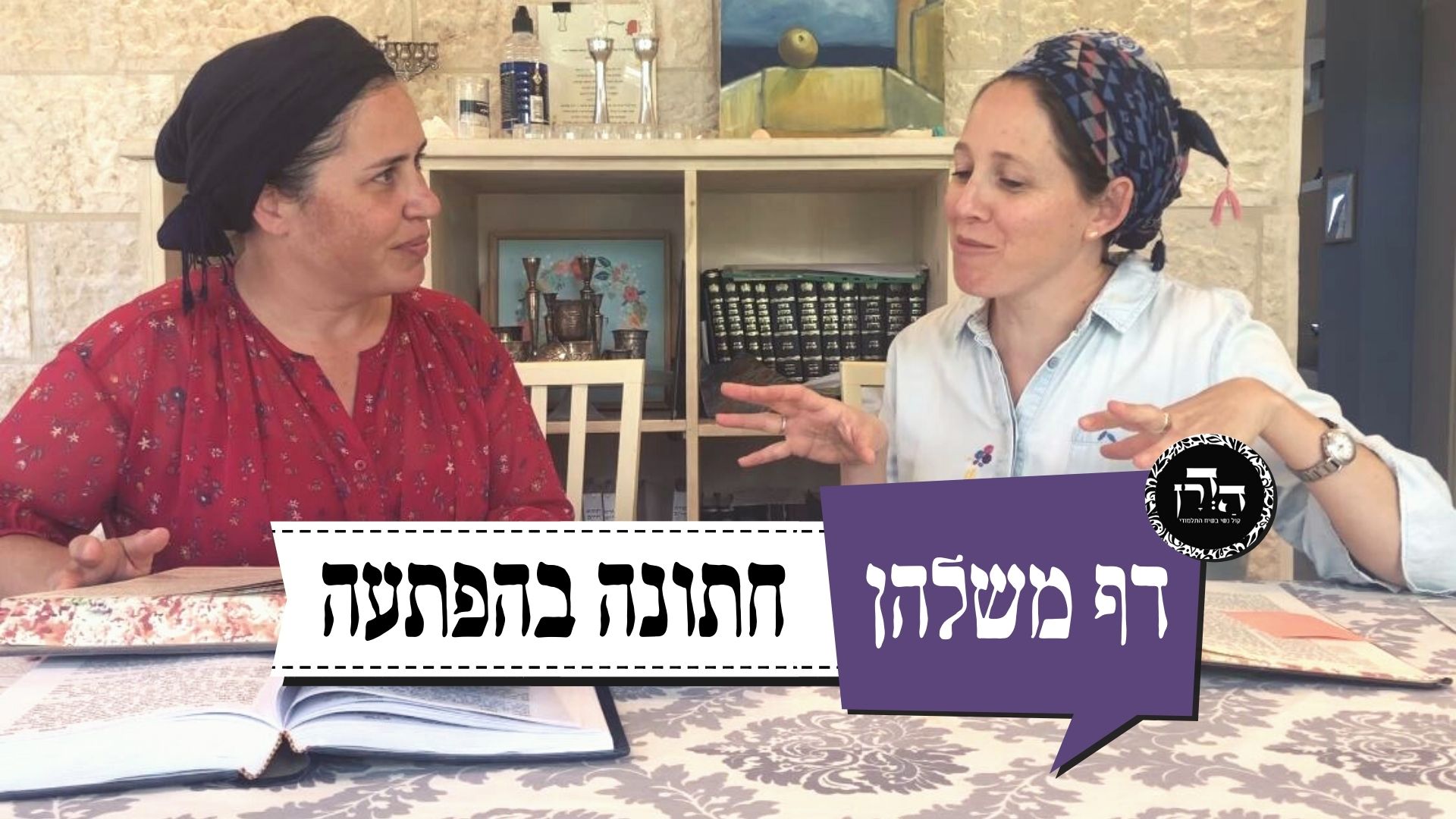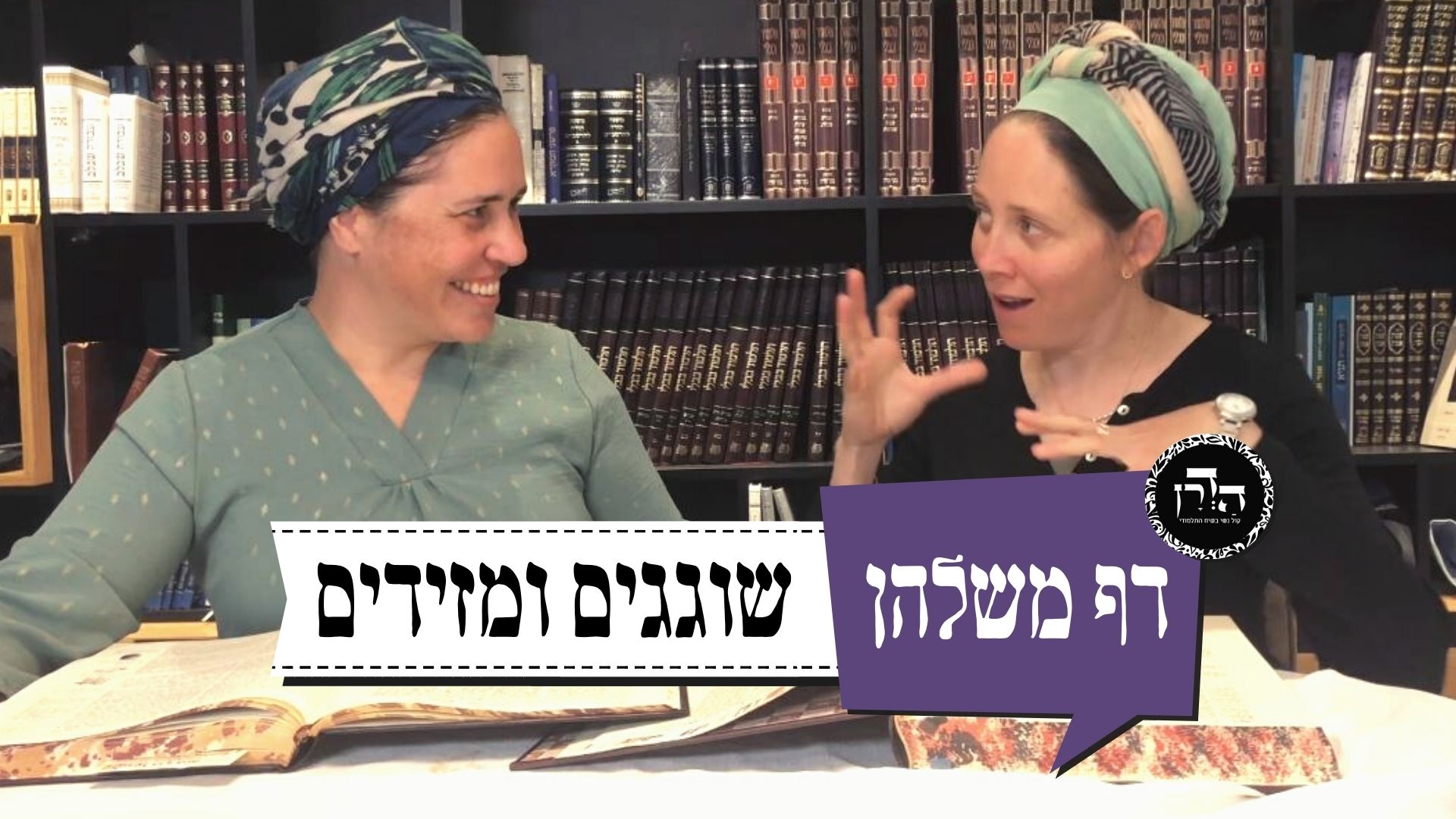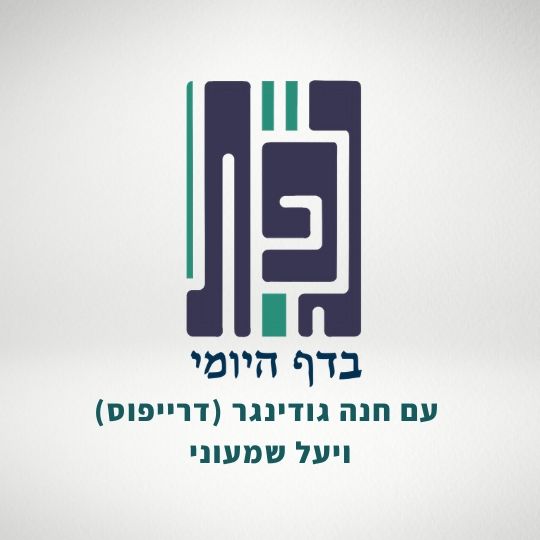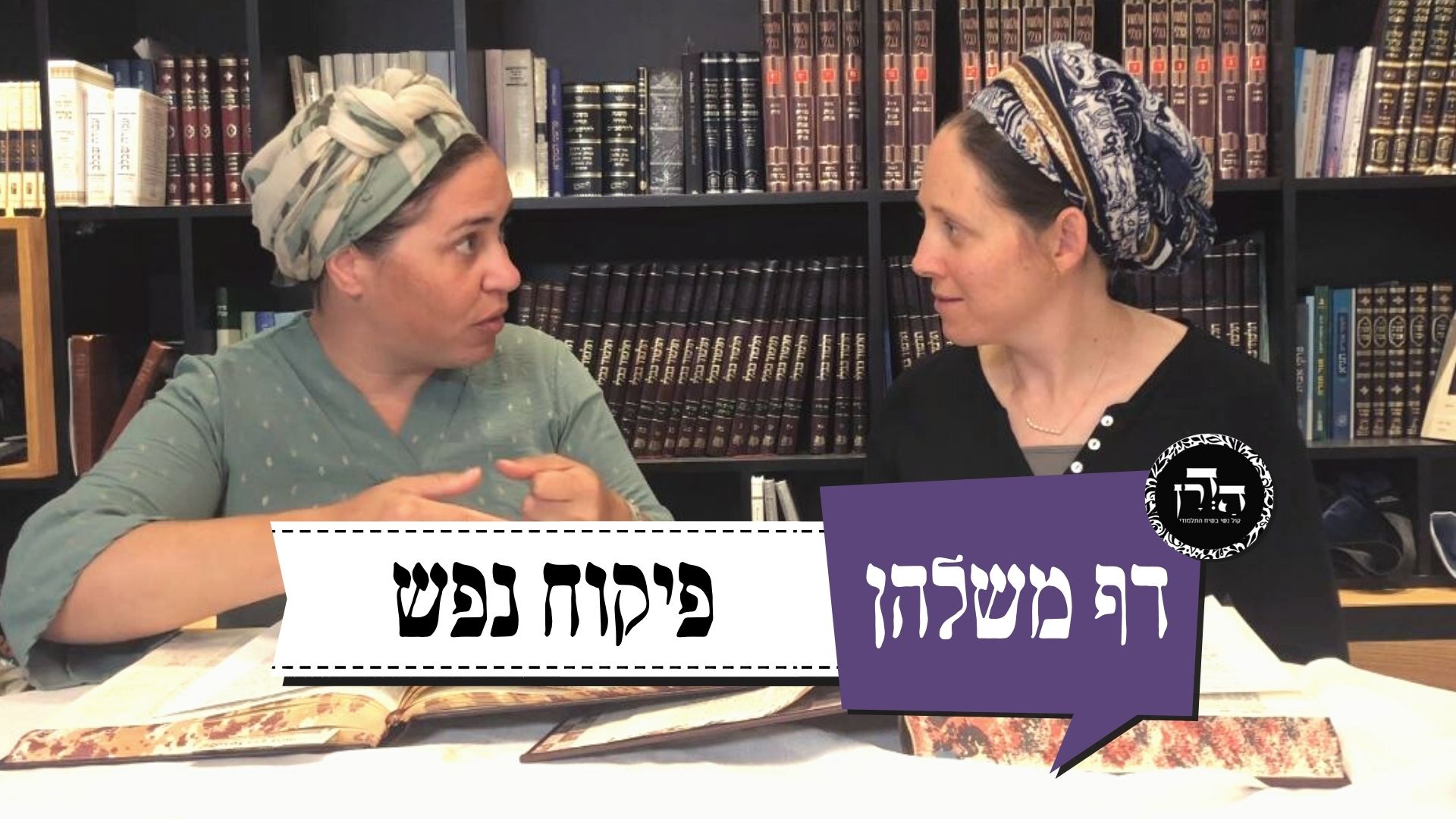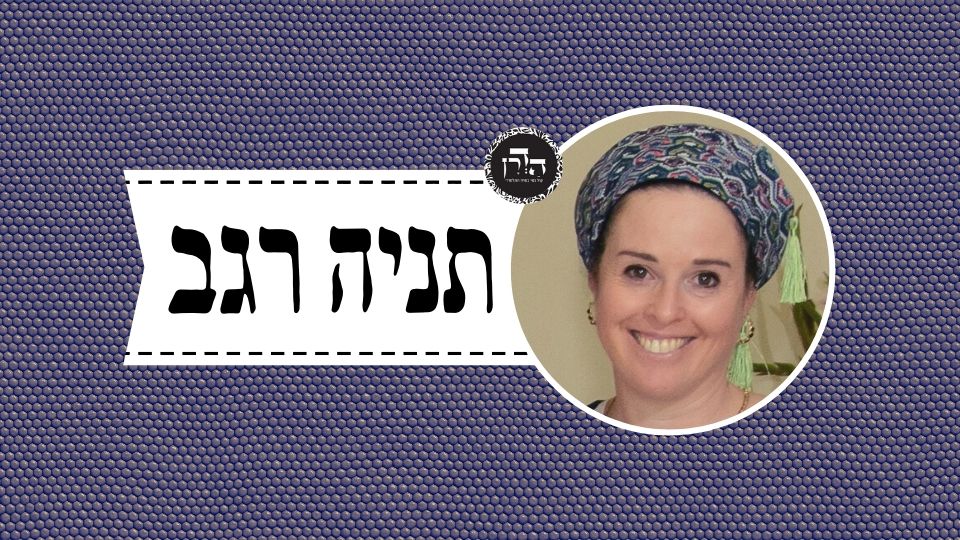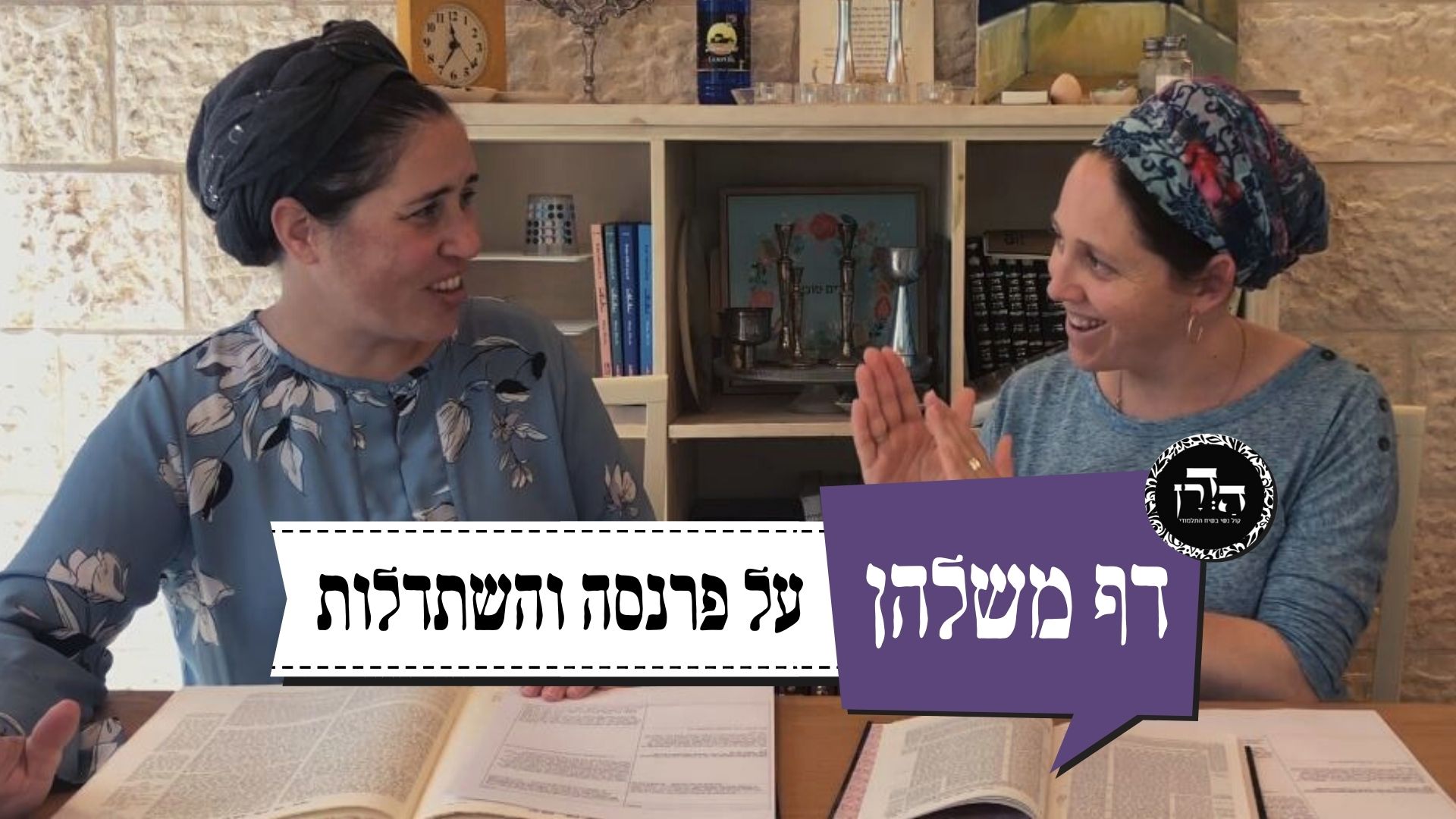ביצה יז
הַיְינוּ קִלְקוּלָא. אָמַר רָבָא אָמַר רַב חִסְדָּא אָמַר רַב הוּנָא: הֲלָכָה כְּרַבִּי, וּלְאִסּוּר.
this is the corruption that might result from a ruling that renders it prohibited to prepare an eiruv the day before. Therefore, this cannot serve as proof of the conclusive ruling. Rava said that Rav Ḥisda said that Rav Huna said: The halakha is in accordance with the opinion of Rabbi Yehuda HaNasi to prohibit one from preparing either type of eiruv. One may not prepare an eiruv either for courtyards or for boundaries, as the halakha is in accordance with Rabbi Elazar’s version of the opinion of Rabbi Yehuda HaNasi.
תָּנוּ רַבָּנַן: יוֹם טוֹב שֶׁחָל לִהְיוֹת בְּשַׁבָּת, בֵּית שַׁמַּאי אוֹמְרִים: מִתְפַּלֵּל שְׁמֹנֶה, [וְאוֹמֵר] שֶׁל שַׁבָּת בִּפְנֵי עַצְמָהּ, וְשֶׁל יוֹם טוֹב בִּפְנֵי עַצְמָהּ. וּבֵית הִלֵּל אוֹמְרִים: מִתְפַּלֵּל שֶׁבַע, מַתְחִיל בְּשֶׁל שַׁבָּת וּמְסַיֵּים בְּשֶׁל שַׁבָּת, וְאוֹמֵר קְדוּשַּׁת הַיּוֹם בָּאֶמְצַע. רַבִּי אוֹמֵר, אַף חוֹתֵם בָּהּ: ״מְקַדֵּשׁ הַשַּׁבָּת, יִשְׂרָאֵל וְהַזְּמַנִּים״.
§ The Sages taught the following baraita: In the case of a Festival that occurs on Shabbat, Beit Shammai say: One must recite an Amida prayer that includes eight blessings, inserting two additional blessings between the standard opening three and concluding three. As for the two middle blessings, one recites one for Shabbat as an independent blessing and a second for the Festival as an independent blessing. And Beit Hillel say: One must pray an Amida comprising only seven blessings, i.e., the three opening ones, the three concluding ones, and one in between. One begins the middle blessing with Shabbat and concludes it with Shabbat, and he recites a passage referring to the sanctity of the day of the Festival in the middle. Rabbi Yehuda HaNasi says: He even concludes this blessing with mention of both Shabbat and the Festival, saying: Who sanctifies Shabbat, the Jewish people, and the seasons.
תָּנֵי תַּנָּא קַמֵּיהּ דְּרָבִינָא: ״מְקַדֵּשׁ יִשְׂרָאֵל וְהַשַּׁבָּת וְהַזְּמַנִּים״. אֲמַר לֵיהּ: אַטּוּ שַׁבָּת יִשְׂרָאֵל מְקַדְּשִׁי לֵיהּ? וְהָא שַׁבָּת מִקַּדְּשָׁא וְקָיְימָא. אֶלָּא אֵימָא: ״מְקַדֵּשׁ הַשַּׁבָּת, יִשְׂרָאֵל וְהַזְּמַנִּים״. אָמַר רַב יוֹסֵף: הֲלָכָה כְּרַבִּי, וְכִדְתָרֵיץ רָבִינָא.
A tanna taught a baraita before Ravina with a slightly different reading: He concludes the blessing with: Who sanctifies the Jewish people, Shabbat, and the seasons. Ravina said to that tanna: Is that to say that the Jewish people sanctify Shabbat? Isn’t Shabbat already sanctified from the six days of Creation? Every seventh day is automatically Shabbat, without the need for any declaration on the part of the Jewish people. Rather, amend it and say as follows: Who sanctifies Shabbat, the Jewish people, and the seasons, as the Jewish people indeed sanctify the New Moon and the Festival days. Rav Yosef said: The halakha with regard to the conclusion of the blessing is in accordance with the opinion of Rabbi Yehuda HaNasi and as the difficulty was resolved by Ravina.
תָּנוּ רַבָּנַן: שַׁבָּת שֶׁחָל לִהְיוֹת בְּרֹאשׁ חוֹדֶשׁ אוֹ בְּחוּלּוֹ שֶׁל מוֹעֵד, עַרְבִית וְשַׁחֲרִית וּמִנְחָה מִתְפַּלֵּל שֶׁבַע, וְאוֹמֵר מֵעֵין הַמְאוֹרָע בָּעֲבוֹדָה, וְאִם לֹא אָמַר — מַחְזִירִין אוֹתוֹ. רַבִּי אֱלִיעֶזֶר אוֹמֵר: בַּהוֹדָאָה. וּבַמּוּסָפִין מַתְחִיל בְּשֶׁל שַׁבָּת וּמְסַיֵּים בְּשֶׁל שַׁבָּת, וְאוֹמֵר קְדוּשַּׁת הַיּוֹם בָּאֶמְצַע.
The Sages taught the following baraita: In the case of Shabbat that occurs on a New Moon or on one of the intermediate days of a Festival, for the evening, morning, and afternoon prayers, one prays in his usual manner, reciting seven blessings in the Amida, and recites a passage pertaining to the event of the day, i.e.: May there rise and come [ya’aleh veyavo], during the blessing of the Temple service, known as retze; and if he did not recite it, he is required to return to the beginning of the Amida prayer and repeat it. Rabbi Eliezer disagrees and says: This passage is recited during the blessing of thanksgiving, known as modim. And in the additional prayer one begins the fourth blessing, the special blessing for the additional service, with Shabbat, and concludes it with Shabbat, and recites a passage pertaining to the sanctity of the day of the New Moon or the Festival in the middle.
רַבָּן שִׁמְעוֹן בֶּן גַּמְלִיאֵל וְרַבִּי יִשְׁמָעֵאל בְּנוֹ שֶׁל רַבִּי יוֹחָנָן בֶּן בְּרוֹקָא אוֹמְרִים: כׇּל מָקוֹם שֶׁהוּזְקַק לְשֶׁבַע, מַתְחִיל בְּשֶׁל שַׁבָּת וּמְסַיֵּים בְּשֶׁל שַׁבָּת וְאוֹמֵר קְדוּשַּׁת הַיּוֹם בָּאֶמְצַע. אָמַר רַב הוּנָא: אֵין הֲלָכָה כְּאוֹתוֹ הַזּוּג.
Rabban Shimon ben Gamliel and Rabbi Yishmael, son of Rabbi Yoḥanan ben Beroka, disagree and say: Wherever one is required to recite seven blessings, whether in the evening, morning, or afternoon prayers, he begins the fourth blessing with Shabbat and concludes it with Shabbat, and recites a passage referring to the sanctity of the day of the New Moon or the Festival in the middle. Rav Huna said: The halakha is not in accordance with the opinion of that pair of scholars; rather, it is in accordance with the opinion of the first tanna, that in the evening, morning, and afternoon prayers one recites the usual seven blessings and recites a passage pertaining to the event of the day during the blessing of the Temple service.
אָמַר רַב חִיָּיא בַּר אָשֵׁי אָמַר רַב: מַנִּיחַ אָדָם עֵירוּבֵי תְחוּמִין מִיּוֹם טוֹב לַחֲבֵרוֹ, וּמַתְנֶה.
§ Rav Ḥiyya bar Ashi said that Rav said: If a person forgot to place an eiruv before a Festival occurring on Thursday and Friday in the Diaspora, he may act as follows: He may place an eiruv for the joining of Shabbat boundaries on the first Festival day for the next, i.e., on the first Festival day for the second Festival day kept in the Diaspora, based on a doubt as to which day is the real day of the Festival, and stipulate as follows: If today is in fact the Festival, then tomorrow is a weekday, on which I may walk as far as I wish in all directions; and if today is a weekday and tomorrow is the Festival, I hereby place an eiruv for the joining of Shabbat boundaries for tomorrow. On the following day he makes a similar stipulation with the same eiruv, so that he will have an eiruv for Shabbat.
אָמַר רָבָא: מַנִּיחַ אָדָם עֵירוּבֵי תַבְשִׁילִין מִיּוֹם טוֹב לַחֲבֵירוֹ, וּמַתְנֶה.
Rava said: A person may place an eiruv for the joining of cooked foods on the first Festival day for the next day and stipulate as follows: If today is a weekday and tomorrow is the Festival, this is my joining of cooked foods, so that I may rely on it to cook tomorrow for Shabbat; and if today is in fact the Festival and tomorrow is a weekday, I may cook tomorrow as on a regular weekday.
מַאן דְּאָמַר עֵירוּבֵי תְחוּמִין — כׇּל שֶׁכֵּן עֵירוּבֵי תַבְשִׁילִין, וּמַאן דְּאָמַר עֵירוּבֵי תַבְשִׁילִין — אֲבָל עֵירוּבֵי תְחוּמִין לָא. מַאי טַעְמָא — דִּלְמִקְנֵי שְׁבִיתָה בְּשַׁבְּתָא לָא.
The Gemara comments: With regard to the one who said this halakha concerning an eiruv for the joining of Shabbat boundaries, all the more so would he permit one to act in this manner concerning an eiruv for the joining of cooked foods. On the other hand, the one who said this halakha with regard to an eiruv for the joining of cooked foods spoke only with regard to the joining of cooked foods; however, as for an eiruv for the joining of Shabbat boundaries, this is not permitted. The Gemara asks: What is the reason for this difference? It is that they did not permit the acquisition of residence on a day of rest, even in a case of uncertainty. However, with regard to an eiruv for the joining of cooked foods, since it is merely symbolic, it is permitted for the sake of the honor of Shabbat.
תָּנוּ רַבָּנַן: אֵין אוֹפִין מִיּוֹם טוֹב לַחֲבֵירוֹ. בֶּאֱמֶת אָמְרוּ: מְמַלְּאָה אִשָּׁה כׇּל הַקְּדֵרָה בָּשָׂר, אַף עַל פִּי שֶׁאֵינָהּ צְרִיכָה אֶלָּא לַחֲתִיכָה אַחַת. מְמַלֵּא נַחְתּוֹם חָבִית שֶׁל מַיִם, אַף עַל פִּי שֶׁאֵינוֹ צָרִיךְ אֶלָּא לְקִיתוֹן אֶחָד. אֲבָל לֶאֱפוֹת — אֵינוֹ אוֹפֶה אֶלָּא מַה שֶּׁצָּרִיךְ לוֹ.
The Sages taught in a baraita: One may not bake bread on one Festival day for the next, i.e., on the first Festival day for the second Festival day kept in the Diaspora. Nevertheless, actually, they said the following established halakha: A woman may fill an entire pot with meat to cook on a Festival, although she requires only one piece for that day, and all the remainder will be for the following day. Similarly, a baker may fill an entire barrel with water in order to heat it up although he requires only a jug of hot water. But with regard to baking, he may bake only that which he requires for that day.
רַבִּי שִׁמְעוֹן בֶּן אֶלְעָזָר אוֹמֵר: מְמַלְּאָה אִשָּׁה כׇּל הַתַּנּוּר פַּת, מִפְּנֵי שֶׁהַפַּת נֶאֱפֵת יָפֶה בִּזְמַן שֶׁהַתַּנּוּר מָלֵא. אָמַר רָבָא: הֲלָכָה כְּרַבִּי שִׁמְעוֹן בֶּן אֶלְעָזָר.
The baraita continues: Rabbi Shimon ben Elazar says: A woman may fill the entire oven with bread, although she does not intend to use it all on that day, because bread bakes well when the oven is full. A full oven has less empty space and is therefore hotter; consequently, filling the oven with bread serves not only to provide bread for the next day but also to improve the bread to be eaten that same day. Rava said: The halakha is in accordance with the opinion of Rabbi Shimon ben Elazar.
אִיבַּעְיָא לְהוּ: מִי שֶׁלֹּא הִנִּיחַ עֵירוּבֵי תַבְשִׁילִין, הוּא נֶאֱסָר וְקִמְחוֹ נֶאֱסָר, אוֹ דִלְמָא: הוּא נֶאֱסָר וְאֵין קִמְחוֹ נֶאֱסָר?
§ A dilemma was raised before the Sages: In the case of one who did not prepare an eiruv for the joining of cooked foods, is he prohibited from cooking for Shabbat and his flour is likewise prohibited, meaning that none of his food may be prepared for Shabbat? Or perhaps only he is prohibited from performing this type of labor, but his flour is not prohibited.
לְמַאי נָפְקָא מִינַּהּ? לְאַקְנוֹיֵי קִמְחוֹ לַאֲחֵרִים. אִי אָמְרַתְּ הוּא נֶאֱסָר וְקִמְחוֹ נֶאֱסָר — צָרִיךְ לְאַקְנוֹיֵי קִמְחוֹ לַאֲחֵרִים. וְאִי אָמְרַתְּ הוּא נֶאֱסָר וְאֵין קִמְחוֹ נֶאֱסָר — לָא צְרִיךְ לְאַקְנוֹיֵי קִמְחוֹ לַאֲחֵרִים. מַאי?
The Gemara asks: What is the practical halakhic difference that emerges from this question? The Gemara explains: There is a difference with respect to whether or not he must transfer ownership of his flour to others. If you say that he is prohibited and his flour is also prohibited, he must transfer his flour to others so that they are able to bake for him if they so desire. But if you say that only he is prohibited but his flour is not prohibited, he need not transfer his flour to others, as they may bake for him even if the flour is not theirs. The Gemara asks: What, then, is the halakha?
תָּא שְׁמַע: מִי שֶׁלֹּא הִנִּיחַ עֵירוּבֵי תַבְשִׁילִין, הֲרֵי זֶה לֹא יֹאפֶה וְלֹא יְבַשֵּׁל וְלֹא יַטְמִין, לֹא לוֹ וְלֹא לַאֲחֵרִים. וְלֹא אֲחֵרִים אוֹפִין וּמְבַשְּׁלִין לוֹ. כֵּיצַד הוּא עוֹשֶׂה — מַקְנֶה קִמְחוֹ לַאֲחֵרִים וְאוֹפִין לוֹ וּמְבַשְּׁלִין לוֹ. שְׁמַע מִינַּהּ: הוּא נֶאֱסָר וְקִמְחוֹ נֶאֱסָר, שְׁמַע מִינַּהּ.
The Gemara answers: Come and hear a resolution from the following baraita: One who did not prepare an eiruv for the joining of cooked foods on a Festival eve may neither bake, nor cook, nor insulate food on the Festival for Shabbat that occurs on the following day, neither for himself nor for others, and others may neither bake nor cook for him. What should he do so that he will have food to eat on Shabbat? He must transfer his flour to others, and they may then bake and cook for him. Learn from here, from the fact that the baraita states that he must transfer his flour to others, that he is prohibited and his flour is also prohibited. The Gemara concludes: Indeed, learn from here that this is the case.
אִיבַּעְיָא לְהוּ: עָבַר וְאָפָה, מַאי? תָּא שְׁמַע: מִי שֶׁלֹּא הִנִּיחַ עֵירוּבֵי תַבְשִׁילִין, כֵּיצַד הוּא עוֹשֶׂה — מַקְנֶה קִמְחוֹ לַאֲחֵרִים, וַאֲחֵרִים אוֹפִין לוֹ וּמְבַשְּׁלִין לוֹ.
Another dilemma was raised before the Sages: In the case of one who transgressed this prohibition and baked on a Festival for Shabbat without having placed an eiruv for the joining of cooked foods on the eve of the Festival, what is the halakha? Is it permitted to partake of his bread and his cooking? The Gemara suggests: Come and hear a resolution to this question from the following baraita: With regard to one who did not prepare an eiruv for the joining of cooked foods, what should he do so that he will have food to eat on Shabbat? He must transfer his flour to others, and they may then bake and cook for him.
וְאִי אִיתָא, לִיתְנֵי: עָבַר וְאָפָה מוּתָּר! אָמַר רַב אַדָּא בַּר מַתְנָה: תַּנָּא, תַּקַּנְתָּא דְהֶיתֵּרָא — קָתָנֵי, תַּקַּנְתָּא דְאִסּוּרָא — לָא קָתָנֵי.
And if it is so that if one baked without having placed an eiruv for the joining of cooked foods, it is permitted to eat the bread, let the baraita simply teach: With regard to one who transgressed the prohibition and baked, it is permitted to eat the bread. Rav Adda bar Mattana said: There is no proof from here, as the tanna is teaching a remedy involving acting in a permitted manner, and is not teaching a remedy involving a prohibited act. The tanna did not want to teach that it is also possible to solve the problem in this proscribed manner.
תָּא שְׁמַע: מִי שֶׁהִנִּיחַ עֵירוּבֵי תַבְשִׁילִין — הֲרֵי זֶה אוֹפֶה וּמְבַשֵּׁל וּמַטְמִין, וְאִם רָצָה לֶאֱכוֹל אֶת עֵירוּבוֹ — הָרְשׁוּת בְּיָדוֹ. אֲכָלוֹ עַד שֶׁלֹּא אָפָה עַד שֶׁלֹּא הִטְמִין — הֲרֵי זֶה לֹא יֹאפֶה וְלֹא יְבַשֵּׁל וְלֹא יַטְמִין, לֹא לוֹ וְלֹא לַאֲחֵרִים. וְלֹא אֲחֵרִים אוֹפִין וּמְבַשְּׁלִין לוֹ.
The Gemara suggests: Come and hear a resolution from a different baraita: One who prepared an eiruv for the joining of cooked foods on a Festival eve may bake and cook and insulate food on the Festival for Shabbat that occurs on the following day, and if he wants to eat his eiruv on Shabbat, he has permission to do so. But if he ate it on the Festival before he baked or before he insulated, he may neither bake, nor cook, nor insulate, neither for himself nor for others, and likewise others may neither bake nor cook for him.
אֲבָל מְבַשֵּׁל הוּא לְיוֹם טוֹב, וְאִם הוֹתִיר — הוֹתִיר לַשַּׁבָּת, וּבִלְבַד שֶׁלֹּא יַעֲרִים. וְאִם הֶעֱרִים — אָסוּר!
However, even without an eiruv, one in this situation may cook for the Festival itself, and if he left over part of what he cooked, he has left it over for Shabbat, provided that he does not employ artifice to circumvent the prohibition by saying that he is cooking a large amount for guests on the Festival, when in fact he has Shabbat in mind. And if he employed artifice to circumvent the prohibition, it is prohibited to eat the food, by decree of the Sages. This indicates that one who cooks on a Festival for Shabbat in a prohibited manner may not eat the food.
אָמַר רַב אָשֵׁי: הַעֲרָמָה קָא אָמְרַתְּ — שָׁאנֵי הַעֲרָמָה דְּאַחְמִירוּ בַּהּ רַבָּנַן טְפֵי מִמֵּזִיד.
Rav Ashi said: This is no proof, as you speak of a case of artifice, and a case of artifice is different, as the Sages were more stringent with regard to one who employs artifice than with regard to one who intentionally cooks on a Festival for Shabbat. One who purposely transgresses is aware of his sin; therefore, he might repent and desist from his prohibited behavior, thereby preventing others from learning from his actions. However, one who employs artifice to circumvent a prohibition thinks that he is acting in a permitted manner. He is therefore likely to continue his practice. Furthermore, people might emulate him, and the halakha of preparing an eiruv might be forgotten.
רַב נַחְמָן בַּר יִצְחָק אָמַר: הָא מַנִּי — חֲנַנְיָה הִיא, וְאַלִּיבָּא דְּבֵית שַׁמַּאי. דְּתַנְיָא, חֲנַנְיָה אוֹמֵר, בֵּית שַׁמַּאי אוֹמְרִים: אֵין אוֹפִין אֶלָּא אִם כֵּן עֵרֵב בְּפַת, וְאֵין מְבַשְּׁלִין אֶלָּא אִם כֵּן עֵרֵב בְּתַבְשִׁיל, וְאֵין טוֹמְנִין אֶלָּא אִם כֵּן הָיוּ חַמִּין טְמוּנִין מֵעֶרֶב יוֹם טוֹב.
Rav Naḥman bar Yitzḥak said that there is another reason to reject the proof from this baraita: In accordance with whose opinion is this baraita? It is in accordance with the opinion of Ḥananya and in accordance with the opinion of Beit Shammai. As it is taught in a baraita that Ḥananya says that Beit Shammai say: One may not bake bread on a Festival for Shabbat unless he prepared an eiruv for the joining of cooked foods on the eve of the Festival specifically with bread; and one may not cook any type of dish unless he prepared an eiruv with a cooked dish; and one may not insulate food unless there was hot food insulated from the eve of the Festival.
ובֵית הִלֵּל אוֹמְרִים: מְעָרֵב בְּתַבְשִׁיל אֶחָד, וְעוֹשֶׂה בּוֹ כׇּל צָרְכּוֹ.
And Beit Hillel say: One may prepare an eiruv for the joining of cooked foods with one cooked dish and use it for all his needs, i.e., baking, cooking, and insulating. Since Ḥananya’s opinion in accordance with the opinion of Beit Shammai is strict in this case, it may be assumed that he is stringent after the fact as well, and therefore the baraita provides no proof.
(תְּנַן:) הַמְעַשֵּׂר פֵּירוֹתָיו בְּשַׁבָּת, בְּשׁוֹגֵג — יֹאכַל, בְּמֵזִיד — לֹא יֹאכַל. לָא צְרִיכָא, דְּאִית לֵיהּ פֵּירֵי אַחֲרִינֵי.
The Gemara offers yet another suggestion. We learned in a mishna: In the case of one who transgressed a rabbinic prohibition and tithed his produce on Shabbat, if he did so unwittingly, he may eat of it; if he acted intentionally, he may not eat of it. This indicates that one may not derive benefit from a transgression that he committed intentionally. The Gemara rejects this argument: No, it is necessary to teach this halakha with regard to a case where he has other produce and therefore does not greatly suffer as a result. However, the Sages may have been more lenient with one who did not make an eiruv for the joining of cooked food and consequently has nothing to eat.
תָּא שְׁמַע: הַמַּטְבִּיל כֵּלָיו בַּשַּׁבָּת, בְּשׁוֹגֵג — יִשְׁתַּמֵּשׁ בָּהֶן, בְּמֵזִיד — לֹא יִשְׁתַּמֵּשׁ בָּהֶן.
The Gemara poses another resolution: Come and hear a proof from a different source: In the case of one who immerses his vessels on Shabbat, an activity that the Sages prohibited because it is akin to repairing a vessel, if he did so unwittingly, he may use them; however, if he did so intentionally, he may not use them. This shows that the product of an action performed in a prohibited manner is prohibited.
לָא צְרִיכָא, דְּאִית לֵיהּ מָאנֵי אַחֲרִינֵי. אִי נָמֵי, אֶפְשָׁר בִּשְׁאֵלָה.
The Gemara rejects this argument: No, it is necessary to teach this halakha with regard to a case where he has other vessels and is not forced to use these ones. Alternatively, it is possible for him to manage by borrowing vessels from others. But if one failed to set aside an eiruv for the joining of cooked foods, perhaps the Sages allowed him to eat the food he cooked on the Festival for Shabbat since it is difficult to obtain food from others on Shabbat.
תָּא שְׁמַע: הַמְבַשֵּׁל בְּשַׁבָּת, בְּשׁוֹגֵג — יֹאכַל, בְּמֵזִיד — לֹא יֹאכַל. אִסּוּרָא דְשַׁבָּת שָׁאנֵי.
The Gemara suggests another proof: Come and hear that which was taught in the following baraita: In the case of one who cooks on Shabbat, if he did so unwittingly, he may eat the food that he cooked; but if he cooked it intentionally, he may not eat it. This demonstrates that one who purposely violated a prohibition may not benefit from his prohibited action. The Gemara rejects this argument: There is no proof from here; the prohibition of Shabbat desecration is different, since it entails karet and execution by a court. The same stringency might not necessarily apply to cooking on a Festival for the sake of the next day, and therefore the question raised above remains unresolved.
בֵּית שַׁמַּאי אוֹמְרִים: שְׁנֵי תַבְשִׁילִין. מַתְנִיתִין דְּלָא כִּי הַאי תַּנָּא, דְּתַנְיָא, אָמַר רַבִּי שִׁמְעוֹן בֶּן אֶלְעָזָר: מוֹדִים בֵּית שַׁמַּאי וּבֵית הִלֵּל עַל שְׁנֵי תַבְשִׁילִין שֶׁצָּרִיךְ, עַל מָה נֶחְלְקוּ — עַל דָּג וּבֵיצָה שֶׁעָלָיו, שֶׁבֵּית שַׁמַּאי אוֹמְרִים שְׁנֵי תַבְשִׁילִין. ובֵית הִלֵּל אוֹמְרִים: תַּבְשִׁיל אֶחָד. וְשָׁוִין, שֶׁאִם פִּרְפֵּר בֵּיצָה וְנָתַן לְתוֹךְ הַדָּג, אוֹ שֶׁרִסֵּק קַפְלוֹטוֹת וְנָתַן לְתוֹךְ הַדָּג, שֶׁהֵן שְׁנֵי תַבְשִׁילִין.
§ It is stated in the mishna: Beit Shammai say that for the purpose of the joining of cooked foods one must prepare two cooked dishes, whereas Beit Hillel say that one dish suffices. The Gemara comments: The mishna is not in accordance with the opinion of this tanna, who taught in the Tosefta that Rabbi Shimon ben Elazar said: Beit Shammai and Beit Hillel agree that two dishes are necessary. With regard to what do they disagree? They disagree with regard to a fried fish and the egg on it, as Beit Shammai say: Two proper dishes are required, and this fish is considered only a single dish; and Beit Hillel say: One dish of this kind is viewed as two dishes and is therefore suitable for an eiruv for the joining of cooked foods. And they both agree that if one sliced a cooked egg and placed it inside the fish, or if he mashed leeks [kaflotot] and placed them inside the fish, they are considered two dishes.
אָמַר רָבָא: הִלְכְתָא כְּתַנָּא דִּידַן, וְאַלִּיבָּא דְּבֵית הִלֵּל.
Rava said: The halakha is in accordance with the opinion of the tanna of our mishna and in accordance with the opinion of Beit Hillel that one dish suffices.
אֲכָלוֹ אוֹ שֶׁאָבַד — הֲרֵי זֶה לֹא יְבַשֵּׁל עָלָיו וְכוּ׳. אָמַר אַבָּיֵי: נָקְטִינַן, הִתְחִיל בְּעִיסָּתוֹ וְנֶאֱכַל עֵירוּבוֹ — גּוֹמֵר.
The mishna states that if one ate the food prepared before the Festival as an eiruv or if it was lost, he may not rely on it and cook with the initial intent to cook for Shabbat. Abaye said: We have a tradition that if one prepared a proper eiruv and began kneading his dough on a Festival for Shabbat, and in the meantime his eiruv was eaten, he may finish baking the bread. Since he had begun in a permitted manner, he is allowed to complete the process and bake the bread.
מַתְנִי׳ חָל לִהְיוֹת אַחַר הַשַּׁבָּת — בֵּית שַׁמַּאי אוֹמְרִים: מַטְבִּילִין אֶת הַכֹּל מִלִּפְנֵי הַשַּׁבָּת. וּבֵית הִלֵּל אוֹמְרִים: כֵּלִים מִלִּפְנֵי הַשַּׁבָּת, וְאָדָם בְּשַׁבָּת.
MISHNA: If a Festival occurs directly after Shabbat, i.e., on a Sunday, and one wishes to behave in a proper manner and purify himself and his vessels in honor of the Festival, Beit Shammai say: One must immerse everything before Shabbat, and Beit Hillel say: Vessels must be immersed before Shabbat, but a person may immerse himself even on Shabbat.
וְשָׁוִין שֶׁמַּשִּׁיקִין אֶת הַמַּיִם בִּכְלִי אֶבֶן לְטַהֲרָן, אֲבָל לֹא מַטְבִּילִין. וּמַטְבִּילִין מִגַּב לְגַב וּמֵחֲבוּרָה לַחֲבוּרָה.
And Beit Shammai and Beit Hillel both agree that one may bring ritually impure water into contact with ritually pure water in stone vessels on Shabbat in order to purify the water. Impure water can be purified if it is placed into a vessel that does not contract ritual impurity, such as a stone vessel, and then lowered with the vessel into a ritual bath. The water becomes purified when it comes into contact with the water of the ritual bath. Although this is not considered proper immersion, water may nevertheless be purified in this manner. However, one may not immerse the impure water in a ritually impure vessel in order to purify the vessel at the same time. Likewise, one may immerse on a Festival from one principle to another, and from one group to another, as will be explained in the Gemara.
גְּמָ׳ דְּכוּלֵּי עָלְמָא מִיהַת — כְּלִי בְּשַׁבָּת לָא. מַאי טַעְמָא? אָמַר רַבָּה: גְּזֵרָה
GEMARA: In any event, everyone agrees, i.e., both Beit Shammai and Beit Hillel agree, that one may not immerse a vessel on Shabbat. The Gemara asks: What is the reason that one may not do so? Which type of prohibited labor does it involve? Rabba said: It is a decree issued by the Sages as a preventive measure,

